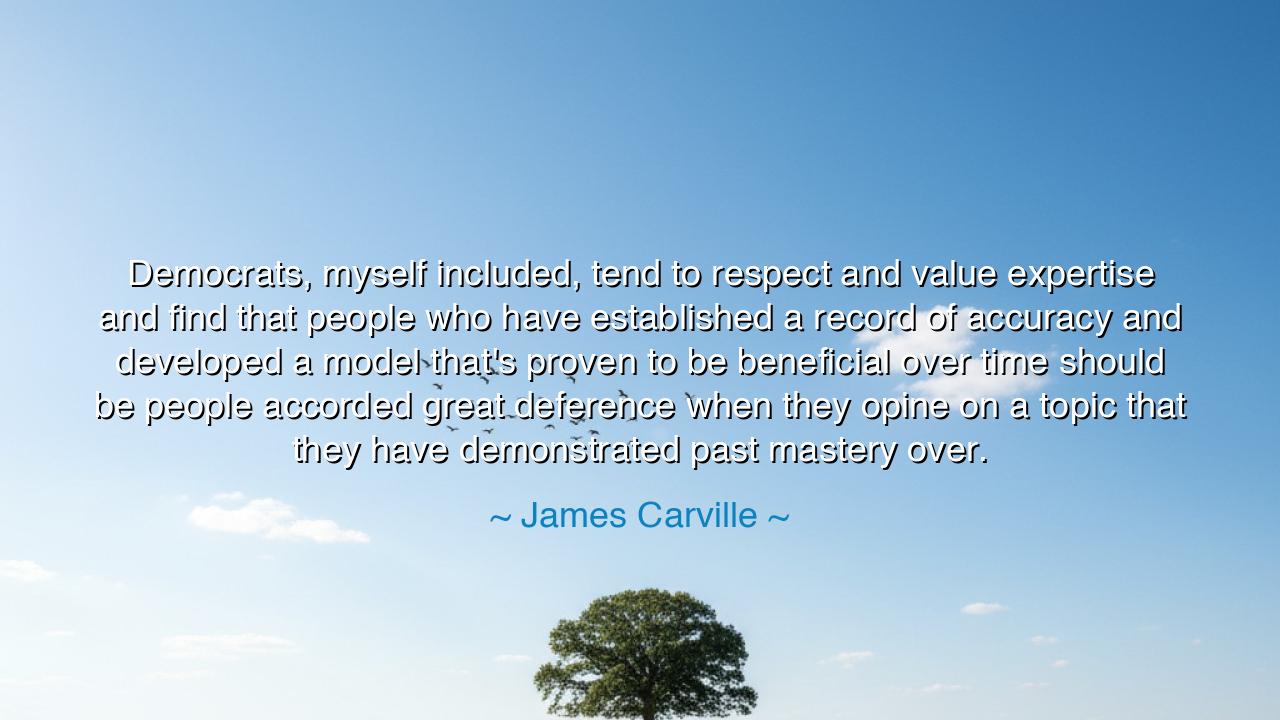
Democrats, myself included, tend to respect and value expertise
Democrats, myself included, tend to respect and value expertise and find that people who have established a record of accuracy and developed a model that's proven to be beneficial over time should be people accorded great deference when they opine on a topic that they have demonstrated past mastery over.






In the vast and ever-shifting landscape of knowledge and discourse, few principles stand as tall as the recognition of those who have earned their expertise through dedication, accuracy, and proven success. James Carville, in his profound statement, declares, "Democrats, myself included, tend to respect and value expertise and find that people who have established a record of accuracy and developed a model that's proven to be beneficial over time should be people accorded great deference when they opine on a topic that they have demonstrated past mastery over." These words speak to the essential idea that true wisdom is earned through years of effort, knowledge, and results—qualities that should be recognized and respected in any field.
In the ancient world, respect for those who had demonstrated deep knowledge and skill was a cornerstone of civilization. Socrates, the great philosopher, did not consider himself a master in the traditional sense, but rather a guide who sought to provoke thought and uncover truth. However, those who had proven their expertise in areas such as medicine, law, or governance were treated with great deference by society. Hippocrates, the father of medicine, was revered not simply for his theories but for the practicality and accuracy of his methods, which helped to lay the foundation for modern medical science. He, like the experts Carville speaks of, was honored not just for what he knew, but for the results of his work—results that endured over time and benefitted countless people.
The ancient Romans held respect for experts in fields such as law, engineering, and military strategy. Cicero, the famous Roman orator, recognized that a person's authority was rooted in their past deeds and the knowledge they had accumulated. In his work, De Officiis, Cicero states that a person’s credibility and influence in society should be based on their expertise and virtue. Just as Socrates and Hippocrates were respected for their contributions, Cicero believed that individuals who demonstrated proven mastery should be given deference, as their wisdom was earned through both experience and accomplishment.
Carville's view on expertise aligns with these ancient beliefs. In his reflection, he highlights that expertise is not just a matter of academic credentials but a practical, lived experience that proves itself over time. This is much like the way Alexander the Great relied on the counsel of his trusted generals and strategists—men who had earned their positions through their wisdom and success in battle. Alexander did not base his decisions on untested theories, but on the advice of those who had shown through action and results that they understood the complexities of leadership and warfare. In much the same way, Carville emphasizes that those who have demonstrated mastery in a field should be granted the deference and respect their work has earned them.
The story of Leonardo da Vinci, the polymath whose contributions to art, science, and engineering have stood the test of time, further exemplifies this principle. Da Vinci was not only a brilliant artist but also an inventor and scientist, whose accurate observations and innovative models have shaped countless fields. People respected his opinions not because he held formal titles, but because his work spoke for itself—through the precision of his paintings and the brilliance of his designs. Similarly, Carville’s words remind us that those who prove their expertise through practical results over time should be treated with the same level of respect and trust.
The lesson from Carville’s statement is clear and profound: true expertise is not simply a matter of theory, but of action and outcome. Whether in the fields of medicine, politics, science, or art, the respect and deference given to experts should be rooted in the proven impact of their work. This respect is not about blind worship but an acknowledgment that their knowledge has been earned through effort, accuracy, and practical success. It is through this understanding that we build a society where wisdom is valued and where those who have mastered their fields are given the space to guide, teach, and inspire.
In our own lives, we can apply this wisdom by seeking out those who have earned their expertise and giving them the respect they deserve. Whether it’s in our professional careers or in our personal lives, we should look to those who have demonstrated accuracy, wisdom, and integrity to help us navigate the complexities of life. By doing so, we not only honor their work but also allow ourselves to benefit from their guidance and experience. Carville’s call to value expertise reminds us that true wisdom is not just about knowing, but about proven results, and that those who lead with such wisdom deserve our utmost respect and trust.






AAdministratorAdministrator
Welcome, honored guests. Please leave a comment, we will respond soon